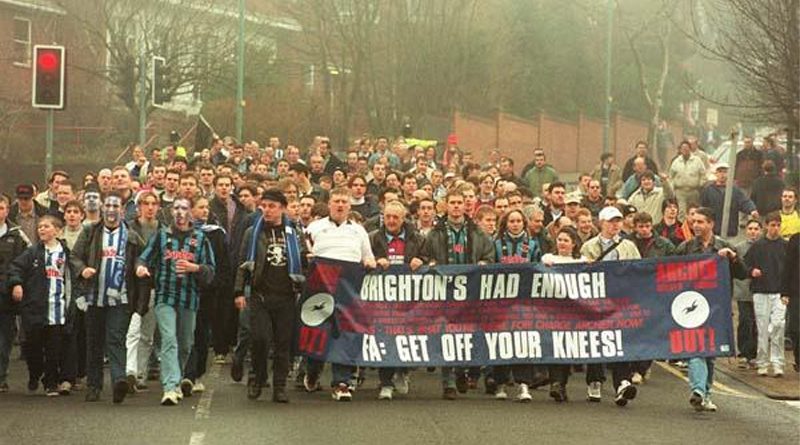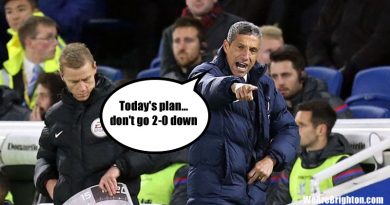From Brighton to Reading, football needs an independent regulator
16 minutes played. A game in the third tier of English football. Fans on the pitch as a desperate, last resort attempting to bring national attention to an owner driving their club out of business. What happened at Reading on Saturday 13th January 2024 was almost identical to what happened at Brighton on Saturday 26th April 1996, making the case for an independent football regulator stronger than ever.
The level of football was the same, although Division Two has since been rebranded as League One. The reaction of the visiting supporters was the same.
Port Vale fans shook hands with their Reading counterparts, just as the travelling York City contingent started their own “Archer out” chorus at the Goldstone.
And the outcome was the same. Game abandoned and the pitch invasion bringing Reading and Dai Yongge’s ownership to national attention.
The only difference being Brighton fans went for a more extreme approach, snapping the crossbars in two to ensure their game with the Minstermen could not restart.
Brighton made front and back page headlines for the ‘York Riot’. It became one of the major turning points in the battle to save the Albion, waking up the world to the asset stripping being carried out by Bill Archer, Greg Stanley and David Bellotti.
The FA could no longer look the other way. 12 months after the York game and against all the odds, Dick Knight became Albion chairman. Brighton survived.
And after a long, long road through homelessness, playing at a rented athletics track, a near-decade long battle to get a permanent stadium and almost going broke, the Albion now play Europa League football. It really is an astonishing story.
Brighton supporters will never though forget how close their club came to going out of business. How a businessman from Lancashire was able to buy the Albion for £56.25.
How Archer, Stanley and Bellotti removed a non-profit clause from the club’s articles of association, which stated if Brighton ever went out of business that all money left had to go to other sporting causes in Sussex rather than into the pocket of individuals.
Archer, Bellotti and Stanley then proceeded to sell the Goldstone, knowing they could now walk away with the money from the sale.
And it would have worked were it not for the likes of Paul Samrah and The Argus discovering what had happened, leading Albion supporters to launch a two-year long battle to save the club.
What happened to Brighton between 1995 and 1997 should have been a wake up call for football’s governing bodies in England. Yet here we are, over 25 years later, with fans still having to take drastic action in getting games abandoned because their club is heading for extinction.
Since the Albion, countless other clubs have come close to going out of business at the hands of unscrupulous owners with no care for institutions centuries old and steeped in their local communities.
Doncaster Rovers. Hull City. Wrexham. Coventry City. Plymouth Argyle. Blackpool. Bolton Wanderers. Charlton Athletic. Southend United. Scunthorpe United. There are many more. And in the sad case of Bury, extinction was their fate.
Which is why football needs an independent regulator with actual powers to oversee and protect the game. To better enforce profit and sustainability rules and ensure fair distribution of money.
To prevent anything which could break up the pyramid, like the European Super League. And to more thoroughly scrutinise takeovers in the hope of preventing future Archers, Yongges and anyone else from buying and destroying clubs.
It would presumably take a tougher stance on sportswashing too, such as the takeover of Newcastle United by Saudi Arabia’s Public Investment Fund
Just this week, it was revealed that Newcastle chairman Yasir al-Rumayyan is facing a £58 million lawsuit for allegedly “having carried out the instructions” of Saudi Arabia’s crown prince, Mohammad bin Salman, with “malicious intent”.
Rumayyan is accused of “harming, silencing and ultimately destroying” the family of Dr Saad Aljabri, the kingdom’s former intelligence chief. Rumayyan sounds like exactly the sort of nice chap you want involved in an English football club.
The government is due to put a football governance bill in front of parliament this year, as announced in November’s King’s Speech. It includes the creation of an independent regulator, per the recommendations of the the fan-led review carried out by Tracey Crouch MP.
Not everyone supports the introduction of an independent regulator, however. The Football League is broadly behind it. The Premier League less so.
Governance of the top flight of English football is currently carried out almost exclusively by the 20 clubs themselves. An independent regulator would threaten this power, meaning the Premier League would no longer have total autonomy when it comes to making its own rules and marking its own homework.
A good example of this came recently when the 20 clubs voted against a temporary ban between the Premier League and partner teams abroad.
The rule change was proposed in an attempt to prevent PIF sending players from the four clubs it owns in the Saudi Pro League to Newcastle – including the likes of Cristiano Ronaldo, Sadio Mane and Ruben Neves.
Such loan signings of big-money players could potentially allow Newcastle to circumvent FFP via reduced or zero loan fees and only paying none or a small percentage of wages.
12 clubs voted in favour of a block, including Brighton – even though the club benefits from having Union Saint-Gilloise as a partner club. The Albion deserve credit for supporting a move not in their interests for the greater good of the league.
Not many clubs took that approach. A two-thirds majority was needed for the rule to be passed. It failed to reach the threshold. An independent regulator could have imposed a ban outright.
Paul Barber laid out the Brighton position on an independent football regulator in his programme notes before the 1-1 draw with Crystal Palace back in March 2023.
“Our club is not in favour of a regulator,” wrote Barber. “For a long time, FIFA’s rules have maintained there should be no government interference in our sport. This now looks set to change in our country.”
“Whilst we must accept there will be a reform of football governance, it’s disappointing to think our Government doesn’t believe there is enough high quality people within The FA, Premier League, EFL and 92 fully professional clubs for us to regulate ourselves.”
“We’ve done so for 160 years and although there have been some very tough periods and, like in any complex, diverse and competitive industry, mistakes have been made along the way, the football industry has largely grown and flourished throughout this time to the point where the Premier League is one of our country’s most popular and famous exports.”
“Sadly, some clubs have, however, also gone out of business over this time, and of course, ideally, this should never happen.”
“Clubs play huge, important roles in their communities and mean so much to their fans, but more often than not, the failures have been down to bad ownership, not systemic malfunction.”
“The English football pyramid and the meritocracy that underpins it is precious to us all and we accept that looking at an improvement to financial distributions may help those smaller clubs with much lower incomes, but not without some clear guardrails on how this money is used.”
“It’s very important an independent regulator does not hamstring what is, overall, a very good industry, or damage our ability to compete with European counterparts, or discourage those people like Tony Bloom who are willing to invest in our national sport, supporting thousands of local jobs in the process; plus, let’s not forget English football (and ultimately fans) will end up paying for independent regulation, so the process itself needs careful scrutiny too.”
“It seems particularly harsh that a transparent well-run club like ours, and many other clubs like us, must now pay for regulation of the much smaller number of clubs that are less well run.”
“We are, however, also very mindful that we weren’t always well-run, and that we haven’t always benefited from Premier League revenues.”
“In this regard, we have certainly experienced the lows and highs of football in the past 25 years, so we were very surprised that Tracey Crouch and her team didn’t talk to us at any point.”
“You would have thought our experience of how our fans and our wider community fought to save the club when it was close to extinction, and how it has subsequently been rebuilt on solid financial principles and high standards of integrity, might have been valuable input on such an important topic as the future of our sport.”
“We’re equally concerned at the limited amount of time that has now been set aside for consultation on the White Paper, not least as it contains a number of ambiguities and associated risks for our sport.”
“Having said all of this, we must also acknowledge that the ill-conceived nonsense of things like the European Super League and Project Big Picture haven’t helped football’s case, and maybe we should have been stronger and sought tougher action against those behind such schemes.”
“Ultimately, however, our club will work with the regulator positively and constructively whenever it is finally established.”
In amongst all that, you cannot help but wonder whether Brighton opposition to an independent football regulator is in part driven by the fear of another body having power over the Albion.
The club is notorious for refusing to see or admit it has made a mistake. Currently, the only redress supporters have when they feel the have been mistreated by a club is the independent football ombudsman.
Whilst the IFO will listen to cases put by both sides and then offer a judgement, its ruling are only advisory. It has no power. Clubs can chose to ignore it.
Not only have the Albion done that on a frequent basis when the IFO has criticised or found against them, but we have even seen on a couple of occasions the club release a statement refuting the IFO. Refuting an independent, impartial body put in place to protect football fans.
It is therefore not a leap to suggest the idea of an independent football regulator not only telling Brighton the club is in the wrong but also having the power to make them change course is terrifying for a club desperate for a public image of perfection.
And whilst Barber says it is disappointing the government does not believe there are enough quality people in football for the sport to regulate itself, the evidence suggests the government are right.
(With the caveat that people in glass houses should not thrown stone as the current government hardly inspires confidence in, well, anything).
If football were capable of regulating itself, a stronger fit and proper persons test would be in place. Reading fans might not be on the pitch protesting at their owners. Brighton might not have been asset stripped and made homeless.
The chairman of Doncaster might not have attempted to burn down the main stand at Belle Vue. Coventry might not have spent some of the past 15 years ground sharing with Northampton and Birmingham.
Manchester City might not have 115 FFP charges hanging over them, using lawyers to tie the case up in knots delays for as long as possible. Nation states might not be able to buy Premier League clubs for the purpose of sportswashing.
The European Super League Elite Six trying to break away and destroy English football might not have happened. There would be a fairer distribution of money from the riches of the Premier League down to the lower division and grassroots. And who knows, Bury might not have gone out of business.
One club going out of business is one too many. If an independent regulator can prevent that happening in future, then it has to be a good thing for English football.
It is all very well saying the likes of Brighton are being made to pay for those who are less well run, but football in England is about more than the Premier League or the handful of clubs lucky to have an owner like Bloom and a deputy chairman as open and hardworking as Barber himself.
There are 72 Football League clubs beyond the 20 in the Premier League. Go into non league and you find an even richer tapestry; one which needs protecting too.
It was only pitch invasion which caused the FA to get involved when Archer, Stanley and Bellotti were trying to drive the Albion out of business. Little has changed in 28 years since, as evidenced by the action taken by Reading fans at the Select Car Leasing Stadium.
From Brighton in 1996 to Reading in 2024 and all those other clubs almost destroyed in-between, football needs an independent regulator.




